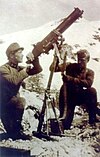Steyr Model 1912 Mauser
| Repetiergewehr M.14 | |
|---|---|
 An Austro-Hungarian M.14 | |
| Type | Bolt-action rifle |
| Place of origin | German Empire/Austria-Hungary |
| Service history | |
| In service | 1912 — Present |
| Used by | See Users |
| Wars | |
| Production history | |
| Designed | 1912 |
| Manufacturer | Steyr |
| Specifications | |
| Mass | 3.97 kilograms (8.8 lb)-4.11 kilograms (9.1 lb) |
| Length | 1,245 millimetres (49.0 in)-1,247 millimetres (49.1 in) |
| Barrel length | 736 millimetres (29.0 in)-740 millimetres (29 in) |
| Cartridge | 7×57mm Mauser |
| Action | Bolt-action |
| Feed system | 5-round stripper clip, internal magazine |
| Sights | Iron sights adjustable to 1,800 metres (2,000 yd) |
The Steyr Model 1912 were Gewehr 98 pattern bolt-action battle rifles produced by Steyr before World War I. They were designed for export market. During the war, they were also used by the Austro-Hungarian Army.
Design
[edit]The rifle was a close copy of the Gewehr 98. It had a pistol grip stock. The rifle featured an "H"-type upper band.[1] The sight was tangent-leaf, graduated to 1,800 metres (2,000 yd) or 2,000 metres (2,200 yd).[2][3] The upper hand guard was shorter.[4]
The carbine and short rifle versions had a turned-town bolt handle and were shorter,[3] with sights graduated until 1,400 metres (1,500 yd).[2]
The version pressed into Austrian service in 1914 was only modified by using a bigger sling swivel.[5]
Service
[edit]
It was ordered by Mexico,[3] Colombia,[4] Chile,[6] China,[7] Mexican Model 1912 were used from 1913 by the Federal Army that fought during the Mexican Revolution.[8] In 1914, 66,979 Mexican-contract rifles, 5,000 Colombian rifles and 43,100 Chilean rifles and carbines were pressed into Austria-Hungarian service as Repetiergewehr M.14.[5]
The Czech vz. 98/22 was a close-copy of the Steyr M1912 and the vz. 12/33 carbine derives from the M1912 carbine.[9] Some of the non-delivered Mexican Model 1912 rifles were modernized as 7.92×57mm Mauser Model 24B in Yugoslavia.[10] In 1929, 5,000 M1912 short rifles, with a 560 millimetres (22 in) barrel, were manufactured by Československá zbrojovka Brno from Steyr spare parts.[11] In 1961, Chilean M1912 were upgraded with a 7.62×51mm NATO 600 millimetres (24 in) barrel, as Modelo 12/61.[12]
Users
[edit]
 Austria-Hungary: Repetiergewehr M.14 [5]
Austria-Hungary: Repetiergewehr M.14 [5] Chile: Modelo 1912 and Model 12/61[6]
Chile: Modelo 1912 and Model 12/61[6] Republic of China (1912-1949): ?[7]
Republic of China (1912-1949): ?[7] Colombia: Modelo 1912[4]
Colombia: Modelo 1912[4] Mexico: Modelo 1912[10]
Mexico: Modelo 1912[10] Kingdom of Yugoslavia: M24B[10]
Kingdom of Yugoslavia: M24B[10]
References
[edit]- ^ Ball 2011, p. 258.
- ^ a b Ball 2011, p. 79.
- ^ a b c Ball 2011, p. 261.
- ^ a b c Ball 2011, pp. 101–102.
- ^ a b c Ball 2011, p. 20.
- ^ a b Ball 2011, p. 76.
- ^ a b Ball 2011, p. 86.
- ^ de Quesada, Alejandro; Jowett, Philip (28 Feb 2006). The Mexican Revolution 1910–20. Elite 137. Osprey Publishing. p. 14. ISBN 9781841769899.
- ^ Ball 2011, p. 112.
- ^ a b c Ball 2011, p. 161.
- ^ Ball 2011, p. 123.
- ^ Ball 2011, p. 77.
- Ball, Robert W. D. (2011). Mauser Military Rifles of the World. Iola: Gun Digest Books. ISBN 9781440228926.

